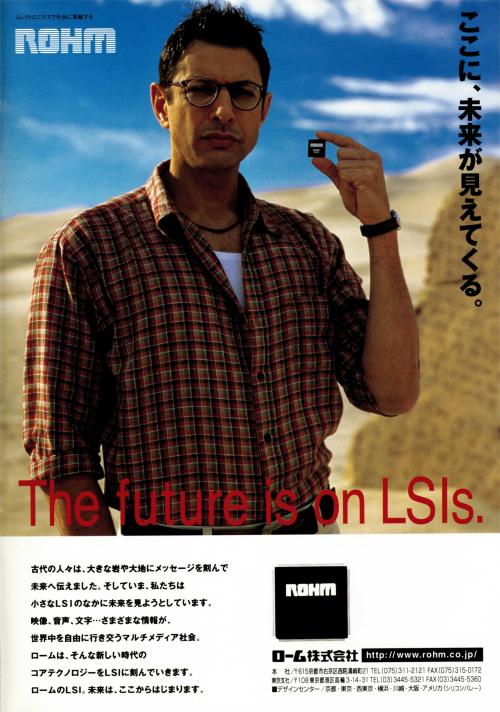Love letter to Senior Vice Justice Minister Taro Kono
Right back at you, asshole! (Update 2006/07/05: That link is hosed. I’m pasting a copy of the article below.)
A Justice Ministry panel studying an overhaul of Japan’s immigration administration is set to propose that the proportion of foreign residents to the nation’s population should be kept at 3 pct or below, Senior Vice Justice Minister Taro Kono said Tuesday.
The proposal will be included in a draft package of immigration policy reform measures to be drawn up shortly, Kono, who heads the panel, told a press conference.
According to the ministry, foreign residents accounted for 1.2 pct of Japan’s population at the end of 2005.
By contrast, the proportion stood at 8.9 pct in Germany in 2001, at 11.1 pct in the United States in the same year and at 5.6 pct in France in 1999.
The panel is also considering requiring foreign nationals of Japanese ancestry to be fluent in Japanese and have regular jobs as conditions for their residency in Japan, Kono said.
Such people are currently allowed to live in Japan if they have relatives in the country.
The panel now believes it necessary to toughen the criteria because the number of problems caused by such residents has been increasing.
Look, if there’s one thing I learned while doing basically every menial job available (short of washing corpses, which I wanted to do for the high pay but couldn’t because of the dirty foreigner thing) in this country, it’s that there are some jobs that Japanese people simply will not do. They simply are not HUNGRY enough to have to do these jobs – on loading docks, factories, piers, junkyards, resorts, roadsides, etc., and I’m not even including illegal shit, just jobs that ARE NOT NICE TO DO. Well guess what? Tens (hundreds?) of thousands of South Americans with Japanese ancestry are willing to do those jobs – and many of them already are. Hell, many people are doing these jobs WITHOUT visas, and Immigration as well as the police are fully aware of the situation – up to and including exactly which room of what shitty little hovel many of these illegals sleep in! This is a societal problem that will NOT be improved BY EFFECTIVELY MAKING CURRENTLY LEGAL WORKERS ILLEGAL.
Isn’t it better to at least have these people paying taxes/soc security and checked on periodically by immigration (during visa applications/extensions) than to have them arrive on tourist visas, work for five or ten years illegally for employers who are cheating the system, and eventually get caught and deported ON OUR DIME?
One thing bugs me about the article though:
The panel is also considering requiring foreign nationals of Japanese ancestry to be fluent in Japanese and have regular jobs as conditions for their residency in Japan, Kono said.
This is referring to the Nikkei (Japanese Ancestral) visa. That’s the one I’m on. I would qualify under these proposed terms now, but I sure wouldn’t have twelve years ago.
Such people are currently allowed to live in Japan if they have relatives in the country.
Uh, no. It’s called the Japanese Ancestral visa because the qualifier is your ancestry, not where you “have relatives.”
What-eva. I’m outta here.




4 Comments
Debiddo
So, when they hit the 3% mark, I am going to sell my “space in Japan” to some foreigner who REALLY wants to come over and teach English or something.
Evil Sandmich
Two words: Reconquista Parades.
I remember when I was in the Dominican we were on a tour that was going through some sugar cane fields and the tour guide was talking about the hard work involved. No offense to the Dominicans, but those people seemed too smart and too well off to do that work (despite the fact that $500 a month is what counts for a decent salary over there). As well, they’re very…um…laid back. I asked the guide and I was right: Hatians are imported to do the work. This also counts for a lot of the menial jobs at the hotel (the Dominicans would fill in the more skilled positions such as chefs or clerks).
Interesting that a country that exports people to the U.S. to do ‘menial’ jobs has to import people for their’s.
Guess there’s no good resolution for this.
gen
J, I was holding back my opinion on this because I knew that there was information lacking.
I’ll forward a review by Arudou Debito of the proposed changes. He was, like you, initially angered by the proposal, but after investigation into the details, his tone has changed significantly.
Please take a moment to read the actual proposal. I’d appreciate your evaluation afterwards.
Gen
///////////////////////////////////////////////////////////
“ON HOW TO ALLOW FOREIGNERS ENTRY FROM NOW ON”
MOJ “PROJECT TEAM REPORT”
TRANSLATION FOLLOWS, YOUR FEEDBACK TO MOJ BY JULY
///////////////////////////////////////////////////////////
July 4, 2006. Freely forwardable
Last newsletter, I wrote you about how Dietmember and Senior Vice Minister of Justice Kouno Taro and folks at the Ministry of Justice have issued a statement regarding future policy regarding immigration and foreign workers. They are accepting feedback on this until Saturday, July 15, so time is of the essence here.
I sent you a blurb of three bullet points, but of course there are more. So before bed last night I pored over the document (available at http://www.moj.go.jp/NYUKAN/nyukan51-1.pdf ). At seven pages, it’s not a bad read. And it’s not all bad news. Allow me to summarize the recommendations immediately below.
(These are not direct translations. All errors, and there may be several in this hasty translation, are mine. Please see original document if you need to check or clarify any sections.):
SUMMARY OF RECOMMENDATIONS
///////////////////////////////////////////////////////////
1. BASIC PREMISES
(1) Cap the foreign population at 3% (not including the Zainichis).
(2) Increase foreign tourism, exchange students, and working holidays.
(3) Increase foreign workers to fill the gaps in sectors where there are labor shortages, working in sectors such as assisting the elderly, part-time, and developing economic sectors. Change (henkou) policy regarding low-wage labor (particularly regarding systems to accept trainees, researchers, and Nikkei workers). [NB: Unclear what direction this “change” will take.]
(4) While expanding foreign labor, increase administration of their residency (zairyuu kanri).
(5) Require foreign laborers to have equal wages with Japanese unemployed (hikoyousha), along with equal social insurance. Punish noncomplying companies.
(6) Have compulsory education for the families of foreign workers.
(7) For a diversifying (tayouka) Japanese society, give due consideration to the nationalities of resident foreigners, without favor towards any one particular country.
(8) Make Immigration procedures rational and efficient.
2. SPECIFIC POLICY RECOMMENDATIONS
(1) REGARDING TRAINEES AND RESEARCH LOW-WAGE WORKERS
— Require Japanese language ability and study for foreign trainees and researchers. Make continuation of employment contingent on improvement in language ability.
— Allow for exceptions under bilateral agreements with countries.
— Restrict these workers to specific economic sectors deemed to need them.
— Restrict this system to allow workers from countries with good guest worker programs (soushutsu taisei).
— Pay workers the equivalent of a Japanese worker if the level of skill is equivalent.
— Create a revolving-door system for foreign workers if they do not plan to stay in Japan.
— Create a system for resident foreign workers to bring over their families, and require a degree of Japanese language ability from them.
(2) REGARDING RESIDENCY FOR FOREIGNERS IN GENERAL
— Create a system for understanding their lifestyles and statuses of residency.
— Require them to advise the authorities whenever they change jobs. This requirement also includes employers to do the same, in order to avoid overstayers.
— Create a similar system for understanding the situations for overstayers.
— Punish offenders and organizations severely.
— Create an information bank between administrative organs overseeing foreigners, in order to serve them better.
— Create a super Gaijin Card which will service foreigners beyond just administrative registering.
— Increase awareness (haaku o okonau) that Zainichis are also residents. [NB: Does this mean they will get a Juuminhyou residency certificate at last?]
— Create a system for severe enforcement and policing of employers who employ foreign overstayers.
(3) REVISING THE NIKKEI WORKER SYSTEM
— Stop importing Nikkei just because they are blood related to Japanese. Increase the technical quality of Nikkei workers from the start.
— Acknowledge that Nikkei families (including those with Japanese citizens) who have been here long-term have increased qualifications to be here.
— Require language ability for their continued residency.
(4) REVISING THE ENTERTAINER VISA SYSTEM
— Crack down on the water trade business expressly importing “entertainers” for prurient purposes.
(5) REGARDING GUEST WORKERS AND EXCHANGE STUDENTS
— Crack down on exchange students becoming overstayers by capping the degree of students to between 1 and 10% of the foreign population.
— Make it easier for the real educational institutions to bring in foreign students.
(6) REGARDING PERMANENT RESIDENCY AND NATURALIZATION
— Encourage (sokushin) foreigners who are contributing to our economy to become established (teichakuka), and loosen restrictions for them to become Permanent Residents.
— Give due consideration those nationalities which will increase our country’s diversity (tayouka).
— Make naturalization more difficult for those applicants who do not have Permanent Residency or Zainichi status.
— Even after granting Permanent Residency, check on their residential status (zairyuu joukyou) and punish offenders. [NB: Unclear what those offenses might be even if you have PR.]
(7) REGARDING CREATING A MORE SECURE LIFESTYLE BASIS (seikatsu kibon)
— Accept foreigners as part of Japanese society, and guarantee their reasonable rights (gouriteki na kenri no hoshou) and make them pay taxes. [NB: Naturally, I’m wondering what kind of rights are involved and how they will be guaranteed.]
— Give foreigners the same social security (nenkin, shakai hoken etc) as unemployed Japanese. Also, take responsibility for their housing and living environment (juukyo tou seikatsu kankyou).
— Enforce compulsory education for families of foreigners, and shorten residency for noncompliers. [NB: I see lots of problems here–see comments below.]
(8) PROMOTING INTERNATIONAL COMMUNICATION AND COOPERATION
— Greatly (oohaba ni) increase the number of working holidayers and tourists.
— Increase scholarships, confer credits to international universities, and bring higher-quality students here.
— Increase the brain drain by bringing foreigners with educational qualifications higher than baccalaureate. [NB: Humph. Watch the universities and Monkashou shoot this down promptly by refusing to reform Japan’s academic apartheid. http://www.debito.org/activistspage.html#ninkisei ]
— Enliven Japan’s international business knowhow by allowing longer-term visas for business expats.
— Increase worker flow from the US and South Korea by considering making border controls more automatic.
(9) RATIONALIZING IMMIGRATION PROCEDURES
— Unify application and renewal procedures.
— Allow for Internet applications and announcements.
///////////////////////////////////////////////////////////
ENDS
COMMENTS
It’s surprisingly not all bad news. There are proposals and ethos that we have been saying repeatedly over the years (particularly about foreigners being taxpayers and contributors to society–bravo!). So let’s give praise where due and criticisms where not.
——————————————
GOOD POINTS:
I basically agree with compulsory education of immigrants. I think anyone who lives in Japan should become as fluent in the Japanese language as possible (as the alternative–functional illiteracy and a lifetime of limited communication ability with society–limits one’s world and severely impinges upon one’s ability to control their own fate). The emerging underclass of uneducated Nikkei youth gangs down south illustrates this quite well.
HOWEVER:
The requirement of improvement of language in order to continue employment, or compulsory education for minors with reduction in residency for noncompliers is definitely open to abuse.
a) Who controls the education of workers, and who assesses their ability and improvements? If it is the employer, any nasty boss could simply report that the level has improved insufficiently and use it as a means of sanction or firing (I personally have experience with this situation). Standards and qualifications should be made clear even at this stage. Nihongo Kentei Shiken at least.
b) What systems are in place for children of foreigners who face bullying and ostracization at school, and cannot for psychological reasons attend? Will they and their families be exiled back to their native country simply because their kids got a raw draw of classmates or teacher? I suggest the Ministry of Education offer ethnic alternatives (such as accrediting the ethnic schools found nationwide) for children who do not, for whatever reason, fit in.
——————————————
MORE GOOD POINTS
I herald increased enforcement of laws regarding overstayers as long as they zero in more on the employers which encourage the practice, by specifically employing foreign labor from a standpoint of weakness (confiscating passports, etc.), and threatening them with exposure if they complain about slave work conditions. Not all overstaying is deliberate, or avoidable, and there has been too much punishment of the victims in Japan. Consequently Japan, as the US State Dept. has famously pointed out, is an egregious human trafficker. Glad to see a crackdown on that at last.
However, this crackdown is also open to abuse with nascent policing (including Permanent Residents) all over again. Central control and notification of even change of employment is open to abuse, with people squealing on foreigners already (through Immigration Snitch Sites, see http://www.debito.org/immigrationsnitchsite.html), and opening them up to all manner of harassment. There has to be a check on police powers here or else there will be wanton raids and racial profiling.
——————————————
I also cheer the lowering of the bar for receiving Permanent Residency and citizenship, and hope that awareness raising campaigns (if any) will be successful in encouraging the popular view that citizenship and residency are not a matter of race. However, there is no clear sign that foreigners will yet get a “juuminhyou” residency certificate. When will Japan do away with the requirement of citizenship for formal registry registration? (http://www.debito.org/residentspage.html#checkpoints)
——————————————
I also am happy with the news that human rights (whatever “reasonable rights” is supposed to mean) should be guaranteed. However, given that Japan’s government recently applied to the newformed Human Rights Committee (and received a seat) without mentioning ONCE a single thing about guaranteeing foreigners’ rights in their application, I think I will take a “wait and see” attitude. More on this later in a Japan Times article.
——————————————
FINAL POINT–SIMPLIFY THINGS, PLEASE!
If Dietmember Kouno and the MOJ were really interested in getting feedback from the public, particularly the international residents whom it will affect, one would hope they would make the Japanese as easy as possible (with furigana as a minimum, and simplified Japanese as a nicety). Not to sound provincial, but an English translation would also have helped. Instead, the proposal starts out with flowery bureaucratic language (such as “honne to tatemae no kairi” (??), the last word I spent at least twenty minutes just trying to find!), completely unnecessary for public (not to mention international) consumption. If you want more feedback from the public, make the policy proposal easier for the public to understand!
Anyway, that’s enough for now. I’ve commented on the arbitrary and unreasonable 3% population cap, so others can point that sort of thing out themselves to the MOJ. I encourage you to do so. By July 15.
——————————————
Address: 100-8977 Houmushou Nyuukoku kanrikyoku Kanri Kikaku Kanshitsu
Fax: 03-3592-7940
Email: nyukan42@moj.go.jp
Questions to 03-3580-4111 ext 5685
It’s all up at http://www.moj.go.jp/NYUKAN/nyukan51.html in Japanese.
Or you can contact Dietmember Kouno Taro directly (he reads English)
at http://www.taro.org
——————————————
Thanks for reading. Back to work.
Arudou Debito in Sapporo
debito@debito.org
http://www.debito.org
July 4, 2006
ENDS
__._,_.___
C. Buddha's Hasty Musings
The End of the Nikkei Visa?
A while back I wrote a post regarding the Ministry of Justice proposing changes to immigration/foreign worker policy, and specifically how the Nikkei (Japanese ancestral) visa will be affected. Gen Kanai left a comment on that post yesterday which I…